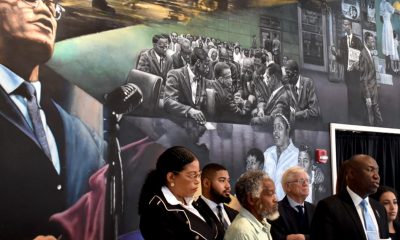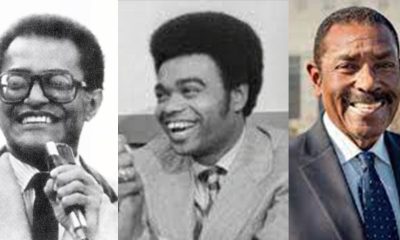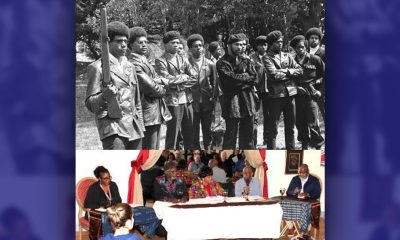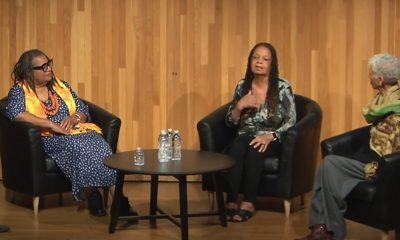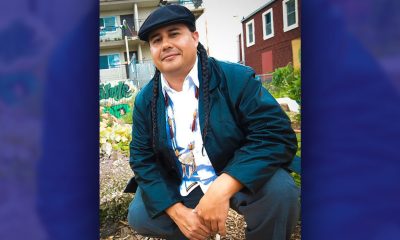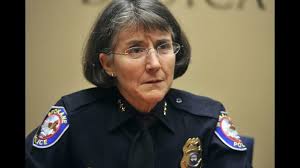Entertainment
‘Black Panther Party’ Film Seeks Wider Audience

The Black Panthers: Vanguard of the Revolution will have a theatrical release in more than a dozen cities across the country this September.
By Jazelle Hunt
NNPA Washington Correspondent
WASHINGTON (NNPA) – The Black Panthers: Vanguard of the Revolution, the first feature-length film to focus on the origin and downfall of the Black Panther Party for Self-Defense is making waves in the film community. It’s been a breakout entry at the Sundance Film Festival, and has already won an award at the Pan African Film & Arts Festival in Los Angeles.
But for acclaimed director Stanley Nelson, the real triumph will be in getting the film to the masses.
“We’re going to film festivals…and getting great, great, great responses. But one of the things that we feel is that film festivals reach a certain segment of the population,” says Nelson, the filmmaker behind Freedom Riders, The Murder of Emmett Till, and other notable documentaries on the African American experience.
“Another segment of the population doesn’t go to film festivals, and those people are the people we want to reach in the theatrical release.”
Thanks to financial backing from PBS, the film will have a theatrical release in more than a dozen cities across the country this September. Still, the documentary team hopes to raise additional funds through donations website, Kickstarter (kck.st/1IjSI1V). These funds will support the film’s expansion via broad advertising, and public appearances and events with the filmmakers and Black Panther Party leaders.
“Our hope is that if we raise a bit more money…as we go through these [13] cities, if we’re successful and recoup our investment, then we’ll just put that money into going to more cities,” Nelson explains. “Our goal is not to make a profit, our goal is to get people out and have as many people see it as we possibly can.”
Other documentaries and movies have either focused on Black Panther figures such as Kwame Toure and Assata Shakur, or have explored the Panthers as one part of a larger picture. The Black Panther Party focuses solely on the organization in its entirety and weaves together a variety of voices, from Party martyrs to those tasked with their destruction. The film also boasts original content from notables such as Kathleen Cleaver, Elaine Brown, Henry Douglas, Elbert “Big Man” Howard, and more.
“One of the things we tried to do in this film is make sure it’s exciting and we tell a new story to everybody,” both the well-informed and the newcomers, Nelson says. “Some of the great things that have happened in the screenings is, people who were Panthers themselves come up to us and say, ‘You know, I was in the middle of it. I didn’t know half the stuff that was in the film.’ There’s a lot of new information.”
Donations through the Kickstarter come with interesting perks, ranging from social media shout-outs for donations as small as $5, to T-shirts, tickets to screenings, autographed photos, and more. For those who cannot donate, Nelson recommends sharing the Kickstarter link with others (kickstarter.com/projects/blackpanthers/the-black-panthers-theatrical-release).
New York, Los Angeles, Oakland, San Francisco, Berkeley, Chicago, Boston, Portland, Philadelphia, Baltimore, Atlanta, Seattle and Washington, D.C. are the 13 initial cities slated for wide release this fall. The film will also be screened at several film festivals around the country throughout the summer. More information on these screenings can be found on www.TheBlackPanthers.com.
Most schools teach little to nothing about the political and social movement launched by the Black Panthers. And in the midst of today’s movements against injustice and discrimination – from police violence to reproductive rights – the film is well timed.
“We want a lot of people to see the film, especially young people. It’s not only a film about the Black Panthers, but the Black Panthers represent young people who really became involved in changing the world,” Nelson says. “Right or wrong, they did feel like they were changing the world. And we want young people to get that message.”
###
Black History
Ashleigh Johnson: Pioneering the Way in Water Polo
Ashleigh Johnson attended Princeton University, where she played for the Tigers and dominated collegiate water polo. During her time at Princeton, she became the program’s all-time leader in saves and was recognized for her extraordinary ability to anticipate plays and block shots. She was a three-time All-American and was pivotal in leading her team to multiple victories. Balancing rigorous academics and athletics, she graduated with a degree in Psychology, showcasing her determination both in and out of the pool.

By Tamara Shiloh
Ashleigh Johnson has become a household name in the world of water polo, not only for her incredible athleticism and skill but also for breaking barriers as the first Black woman to represent the United States in the sport at the Olympic level. Her journey begins as a determined young athlete to a record-breaking goalkeeper.
Born on September 12, 1994, in Miami, Florida, Ashleigh grew up in a family that valued sports and academics. She attended Ransom Everglades School, where she was introduced to water polo. Despite water polo being a niche sport in her community, she quickly stood out for her remarkable agility, intelligence, and reflexes. Her unique skill set made her a natural fit for the demanding role of a goalkeeper.
Ashleigh attended Princeton University, where she played for the Tigers and dominated collegiate water polo. During her time at Princeton, she became the program’s all-time leader in saves and was recognized for her extraordinary ability to anticipate plays and block shots. She was a three-time All-American and was pivotal in leading her team to multiple victories. Balancing rigorous academics and athletics, she graduated with a degree in Psychology, showcasing her determination both in and out of the pool.
In 2016, Ashleigh made history as the first Black woman to be selected for the U.S. Olympic Water Polo Team. Representing her country at the Rio Olympics, she played a crucial role in helping Team USA secure the gold medal. Her stellar performances earned her the distinction of being named the tournament’s top goalkeeper, further cementing her status as one of the best players in the sport’s history.
Ashleigh didn’t just stop at one Olympic appearance. She continued her dominance in water polo, playing a key role in Team USA’s gold medal win at the 2020 Tokyo Olympics. Her ability to remain composed under pressure and deliver outstanding saves in crucial moments made her an irreplaceable member of the team.
At the age of 29, Johnson appeared in her third Olympiad in Paris at the 2024 Summer Olympics. Their first match was against Greece and the US team won easily and Johnson only gave up 4 points. U.S. Olympic head coach Adam Krikorian shared, “She’s an incredible athlete. She’s got great hand-eye coordination, great reflexes and reactions. And then she’s fiercely competitive – fiercely. And you would never know it by her demeanor or by the huge smile on her face. But to us, on the inside, we know how driven she is to be one of the best ever to do it.”
Team USA Women’s Water Polo ended their Olympic season in fourth place after a 10 – 11 loss to the Netherlands. Johnson only allowed 37 percent of the shots from the Netherlands.
Beyond her achievements in the pool, Ashleigh has used her platform to advocate for diversity in water polo and sports in general. As a trailblazer, she recognizes the importance of representation and works to encourage young athletes, particularly those from underrepresented backgrounds, to pursue their dreams.
Ashleigh has spoken about the challenges she faced as a Black woman in a predominantly white sport and how she turned those obstacles into opportunities for growth.
Arts and Culture
In ‘Affrilachia: Testimonies,’ Puts Blacks in Appalacia on the Map

By Terri Schlichenmeyer
The Bookworm Sez
An average oak tree is bigger around than two people together can reach.
That mighty tree starts out with an acorn the size of a nickel, ultimately growing to some 80 feet tall, with a canopy of a hundred feet or more across.
And like the new book, “Affrilachia” by Chris Aluka Berry (with Kelly Elaine Navies and Maia A. Surdam), its roots spread wide and wider.
Affriclachia is a term a Kentucky poet coined in the 1990s referring to the Black communities in Appalachia who are similarly referred to as Affrilachians.
In 2016, “on a foggy Sunday morning in March,” Berry visited Affrilachia for the first time by going the Mount Zion AME Zion Church in Cullowhee, North Carolina. The congregation was tiny; just a handful of people were there that day, but a pair of siblings stood out to him.
According to Berry, Ann Rogers and Mae Louise Allen lived on opposite sides of town, and neither had a driver’s license. He surmised that church was the only time the elderly sisters were together then, but their devotion to one another was clear.
As the service ended, he asked Allen if he could visit her. Was she willing to talk about her life in the Appalachians, her parents, her town?
She was, and arrangements were made, but before Barry could get back to Cullowhee, he learned that Allen had died. Saddened, he wondered how many stories are lost each day in mountain communities where African Americans have lived for more than a century.
“I couldn’t make photographs of the past,” he says, “but I could document the people and places living now.”
In doing so he also offers photographs that he collected from people he met in ‘Affrilachia,’ in North Carolina, Georgia, Kentucky, and Tennessee, at a rustic “camp” that was likely created by enslaved people, at churches, and in modest houses along highways.
The people he interviewed recalled family tales and community stories of support, hardship, and home.
Says coauthor Navies, “These images shout without making a sound.”
If it’s true what they say about a picture being worth 1,000 words, then “Affrilachia,” as packed with photos as it is, is worth a million.
With that in mind, there’s not a lot of narrative inside this book, just a few poems, a small number of very brief interviews, a handful of memories passed down, and some background stories from author Berry and his co-authors. The tales are interesting but scant.
For most readers, though, that lack of narrative isn’t going to matter much. The photographs are the reason why you’d have this book.
Here are pictures of life as it was 50 years or a century ago: group photos, pictures taken of proud moments, worn pews, and happy children. Some of the modern pictures may make you wonder why they’re included, but they set a tone and tell a tale.
This is the kind of book you’ll take off the shelf, and notice something different every time you do. “Affrilachia” doesn’t contain a lot of words, but it’s a good choice when it’s time to branch out in your reading.
“Affrilachia: Testimonies,” by Chris Aluka Berry with Kelly Elaine Navies and Maia A. Surdam
c.2024, University of Kentucky Press, $50.00.
Activism
Oakland Post: Week of December 18 – 24, 2024
The printed Weekly Edition of the Oakland Post: Week of December 18 – 24, 2024

To enlarge your view of this issue, use the slider, magnifying glass icon or full page icon in the lower right corner of the browser window. ![]()
-

 California Black Media4 weeks ago
California Black Media4 weeks agoCalifornia to Offer $43.7 Million in Federal Grants to Combat Hate Crimes
-

 Black History4 weeks ago
Black History4 weeks agoEmeline King: A Trailblazer in the Automotive Industry
-

 California Black Media4 weeks ago
California Black Media4 weeks agoGov. Newsom Goes to Washington to Advocate for California Priorities
-

 Activism4 weeks ago
Activism4 weeks agoOakland Post: Week of November 27 – December 3, 2024
-

 California Black Media4 weeks ago
California Black Media4 weeks agoCalifornia Department of Aging Offers Free Resources for Family Caregivers in November
-

 Activism2 weeks ago
Activism2 weeks agoButler, Lee Celebrate Passage of Bill to Honor Congresswoman Shirley Chisholm with Congressional Gold Medal
-

 Activism2 weeks ago
Activism2 weeks agoPost News Group to Host Second Town Hall on Racism, Hate Crimes
-

 Activism2 weeks ago
Activism2 weeks agoDelta Sigma Theta Alumnae Chapters Host World AIDS Day Event



